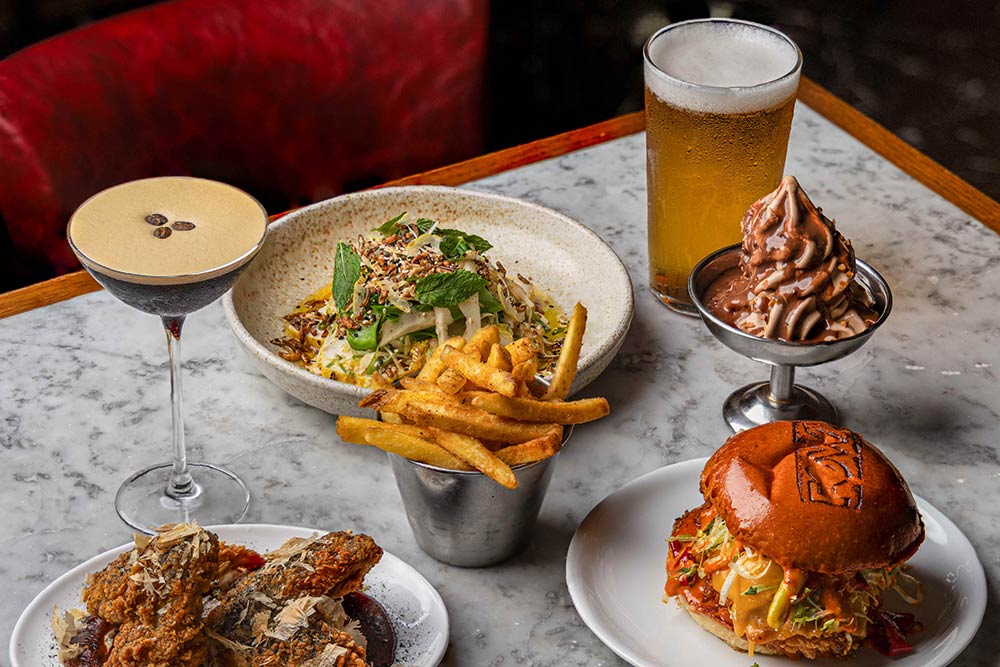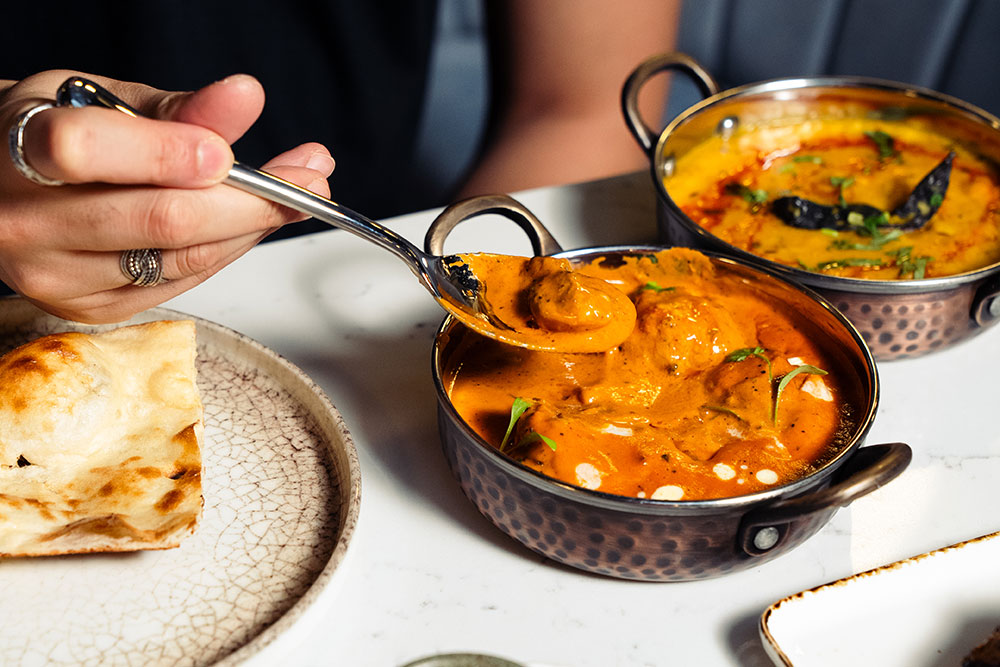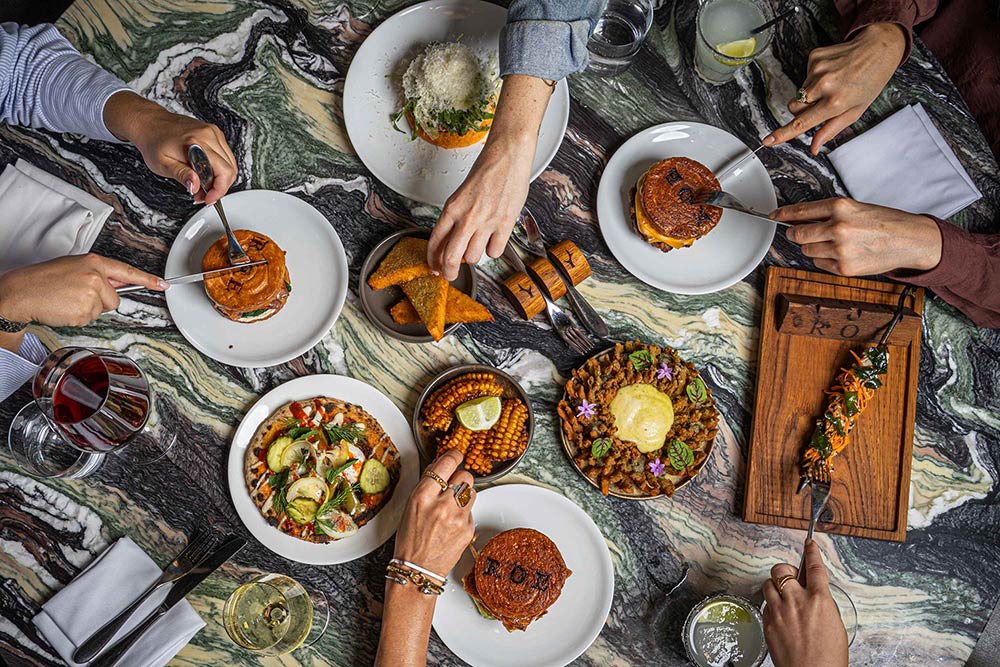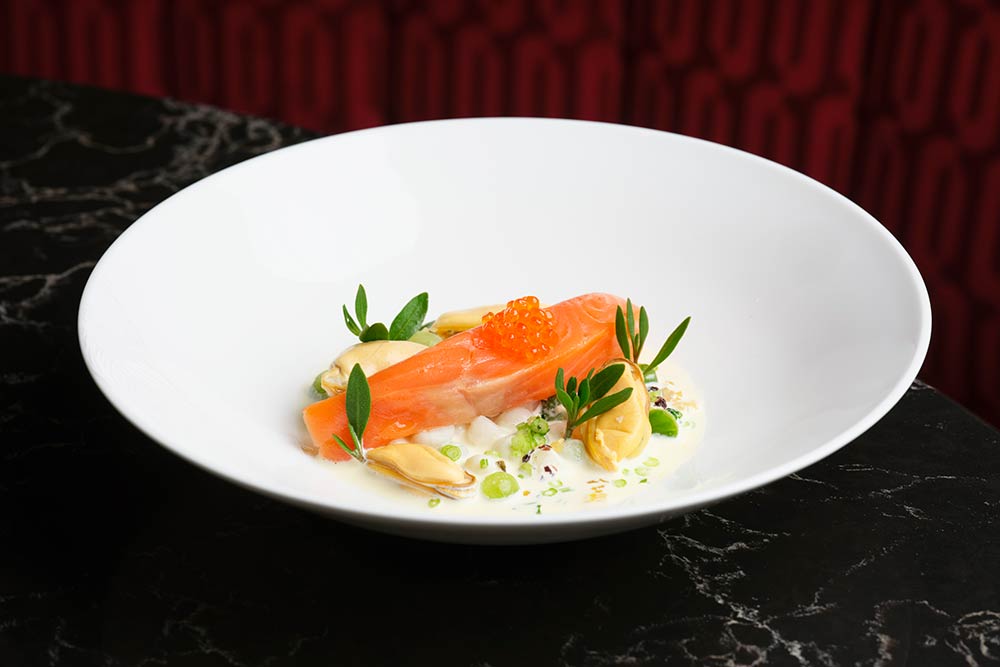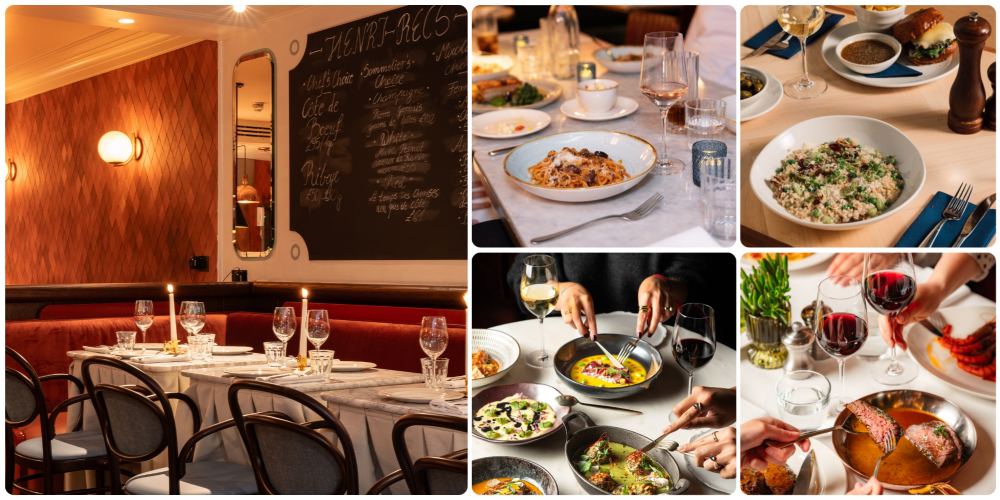Born in Lyon, Claude Bosi trained with top chefs Alain Passard and Alain Ducasse before moving to England in 1997. At the age of 24 he got his first Michelin star at Overton Grange and in 2000 opened his own restaurant Hibiscus with his wife Claire. It went on to earn two Michelin stars. In 2007 he moved the restaurant to London. This year Hibiscus entered the World’s 50 Best Restaurant List at 49 – one of only three British restaurants on the list.
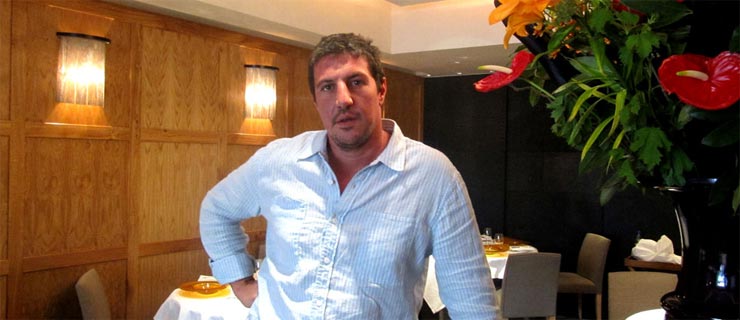
How were you so sure you wanted to be a chef at 16?
Well my parents used to have a restaurant and I’ve always been in that environment of food. I needed to choose what I wanted to do and I just said to my Dad, ‘I want to be a chef.’ I’ve been lucky, my parents have always been supportive in whatever I wanted to do. So they said ‘OK, if you want to do that I’ve got a friend who has a restaurant – you can go off and work with him for the summer, see if you like it’ and that’s what I did. I just loved it.
And then for the next few years you were told by your current chef who’d you’d be working for next. Is that usual?
At the beginning, you’re young, 17 or 18 and you know nothing about what you want to do and you listen to your Chef de Cuisine who tells you where to go to carry on your formation to do something classic but with a twist. And you do that for the first maybe two or three places. After that you start to have more understanding of what you want to do and you choose yourself.
So where was the first place you actually made the decision to go to?
My first place I choose for myself was a place in Lyons called Les Quatre Saisons. It was a small husband and wife restaurant. And from that place I went to La Pyramide in Lyon and from there I went to Paris for my military service – after that I did Le Chiberta (a two-Michelin-starred restaurant). From there I went to Alain Passard at L’Arpege, then to Ducasse and after that I came to England.
It's a bit of an odd career choice going from the heart of Paris to the English countryside. Why did you make that decision?
I didn’t want to go to London because the idea for me was to spend six months here – to learn a bit of the language and go travelling after. You can speak French day in and day out in London and I didn’t want to do that – I wanted to go somewhere where there wasn’t a lot of French and I could improve my English quite quickly.
I started at Overton Grange as a sous chef in November. In February the head chef left and they offered me the job. We got our first Michelin star the following January.
So how did you pick Ludlow?
I went to see a recruitment agency in Paris and said I wanted to go to England. The guy saw my cv – his big eyes opened and he said ‘I’ll get you something by tomorrow’. He said he’d found me a place in Ludlow. I started at Overton Grange as a sous chef in November. In February the head chef left and they offered me the job. We got our first Michelin star the following January.
You were only 24 when you got your first star. Was that something you’d always been working towards?
The idea wasn’t to stay in England for a long time, so no – and as a young chef I could never see myself as running a Michelin-star restaurant, so that’s why I was very surprised when it happened. When I got the first star, I thought I’d stay here a bit longer and then they decided to sell the hotel. I didn’t want to be in the position where the new owner could just come in and change everything so I thought maybe it’s time for me to have my own business.
The only place I could afford was in Ludlow. It was just Claire and I – we didn’t have any partners, we did everything on our own. We found a small restaurant - £40,000 it cost me. We moved in and because I was in Ludlow already. It got busy quickly and then we were there for seven years.
It seems strange, given what a foodie destination Ludlow was at that time, that you didn’t see many of the national critics at Hibiscus.
I think in the seven years I was at Hibiscus I had three at the most. They were Matthew Fort, Charles Campion and Jan Moir.
So what’s the difference between running a restaurant in Ludlow to London? Is one harder than the other?
The countryside is harder. You really need to take care of your locals because they’re your press. They’re the ones talking to others – saying ‘You’ve got to go there, it’s great’. In Ludlow from April to September we were full for lunch and dinner. But from September to April if we didn’t have a local clientele, we’d never have stayed open for so long. It is tougher. You really need to remember the faces of people when they’re coming in – it’s a really intense job. Even if you don’t do as many covers as you do in London the work is twice as hard.
If you can do it in the countryside, then I believe it’s easy in London. The hardest thing in London is that people can come to you one day and go next door the next day. You can’t take them for granted because it’s more expensive to [run a restaurant] in London than in the countryside. There, you have to really look after them when you have them.
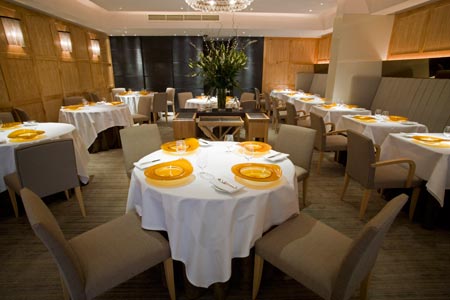
Why, when you were such a big culinary star in Ludlow, did you then decide to come to London
I wanted to come to London in 2004 and at that time Claire said to me, we are not ready yet. We’re too young – we don’t have a big enough reputation to go to London. We should wait a bit. That year we waited and got a second star. Business boomed again and we did another two or three years. But I always loved this city.
So what was the flashpoint for you?
I was visiting my friend [Anthony Demetre] at Arbutus, and I was walking through Soho and I saw all these people and I said to Claire – I really want to come down to London.
When I decided to sell the restaurant, I didn’t have a backer or a site – nothing. I put the restaurant on the market in August, told Michelin we were leaving – really started the ball rolling. From that point there was no going back. One of my customers found I wanted to move to London – he was from London – and said we should have a chat. He said we could maybe do business together. We chatted and I found three partners who’ve been great – very supportive, very understanding of what we want to do here and we’re all working in the same direction.
It’s not easy selling a two Michelin starred restaurant in the middle of nowhere. But in October, Alan Murchison from L’Ortolan was interested, came to have a chat over Christmas and then it was sold.
Why did you pick Maddox Street to set up shop?
This was an empty shell. I wasn’t anticipating the Ladbrokes next door – but it’s not easy to find a site in London! This had an alcohol licence which was what exactly we were looking for. One of my partners is very good on property. He took me here and told me it would work. We found this in February, signed in August and opened on the 28th October.
I thought they’d give us an opportunity to put ourselves down a bit, but as soon as we opened the door the critics just started coming in. Bunch of fuckers!There was a lot of buzz about your move to London. Were you excited by it all?
At the time I felt I made the wrong decision. I thought they’d give us an opportunity to put ourselves down a bit, but as soon as we opened the door the critics just started coming in. Bunch of fuckers! The first week I think we had them all. I don’t need to explain to you it was a nightmare. Taking it back I wish we’d taken some time, run it for a bit at half price but I couldn’t afford it.
The first person past the door was Jan Moir – the very first paying customer. And that was the meal she did the review from – she loved it. It was quite funny because when she came to Ludlow she’d said ‘Hibiscus is so special it could never work in London.’
More recently Nuno Mendes got a bit of stick for insisting on strict no-photography or blogging rule for his soft launch for Viajante. Would you have preferred to have done that?
That’s quite clever – he’s right. We moved our kitchen in on a Thursday and I think I did my first service on a Tuesday. I should never have done it that quickly. But you learn from your mistakes. The next time, I’d take plenty of time to do it.
When you moved to London you lost one of your Michelin stars – had you anticipated that happening?
To be honest I was disappointed, but we weren’t ready. I think Michelin made a fantastic decision at that time – even if it’s painful to say it. We opened in late October and normally the inspections for the year are roughly finished by the first week of November. They did a lot of inspection at the beginning and we weren’t ready. When the Michelin guy came and said he wanted to tell me himself that we hadn’t got back the second star, I was devastated. They said we’ll give you a rising two star. It’s a big thing – two Michelin stars – and they said they couldn’t make a judgement on two weeks. I said we just have to keep our heads down, keep focused, make sure the restaurant’s busy and the good thing was there were no new two stars that year. We got it back in 2009 and that was that.
Any chef who has two stars and says ‘Fuck it, I’m happy with my two stars’ is a liar. Chefs have got massive egos, you know.
So you’re on the hunt for three stars?
So many chefs say to me, ‘You’ve got two stars, four rosettes – you’re in the World’s Top 50 – don’t do it!’. But you need the challenge in life. Any chef who has two stars and says ‘Fuck it, I’m happy with my two stars’ is a liar. Chefs have got massive egos, you know.
What, in your opinion, raises a restaurant from two to three stars?
The partnership between the restaurant and the kitchen – the overall experience, from the moment you pass the door to when you leave the restaurant – the whole package. I know a lot of people can’t understand why Alain Ducasse got three but that what Gordon’s got, what Heston’s got at the Fat Duck, at the Waterside – they’ve got this balance between the restaurant and the kitchen perfect. You go to the Dorchester and the service is fantastic. The food is two-star but if you’ve got all these two elements right – you need to be a hole in one.
A lot of people seem to think you’re on course to win a third star.
Well I hope someone is listening to them. But to get that right balance is really hard.
We spoke to you just after you entered the World’s 50 Best Restaurants list – how has that changed things for you?
It just boosted the business – it was madness. To give you an idea, last year in May we did about 300 covers a week. Now we’ll do about 400-450 a week. It’s a really big thing. Today’s the first day we haven’t had the private room booked. For the last three weeks it’s gone mad and it’s just fantastic.
Will you be doing the London Restaurant Festival again this year?
I will do the Restaurant Odyssey – and we’ll do 10:10:10 (where 10 high profile out-of-town chefs come to London to work alongside their city peers for a very special Sunday lunch) and I’m talking to a friend about doing it with me – he’s not from England. I’m trying to get him to do that with us.
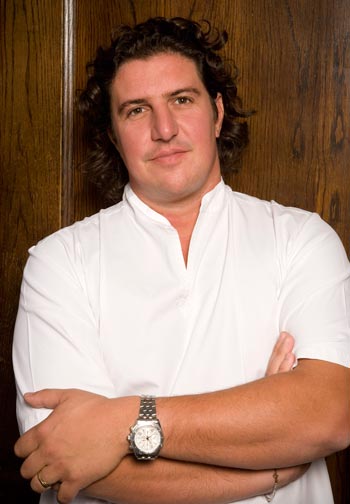
It's clear you love being in London. So where do you like to eat out?
I love Arbutus and Wild Honey – Anthony’s a great friend of mine and what I love about it is the fantastic food. He’s a great cook – he’s so simple, so earnest. I love his places. I had a great meal at Royal Hospital Road in April. Clare Smyth is doing a fantastic job there – really, really good. You can see why it’s three star – as a normal customer, the package was fantastic. Jean-Claude’s doing a fantastic job in front – he makes you feel so at home – so it was a great dinner.
And who’s work is exciting you right now?
I love what Nuno’s doing. I’ve been twice now to Viajante – I went with the 50 Best chefs. I loved what he used to do at Bacchus, and I think he’s going to be fantastic there. I love the guy – he’s so humble, so nice. There’s nothing bad about that guy – the food is fresh and pure – not chichi – it’s still food, even if it’s a bit different. We’ve got some great openings coming up in London this year, we’ve got Heston, Joel Antunes who’s opening this week. Bar Boulud is very good – and we’ve got Koffman opening.
What about you? Do you have any other projects on the go?
I’d like to open a pub with my brother. You know we used to have a pub in Ludlow (The Bell Inn). The pub used to be mine and his – we used to run it together – we closed it down in February. I’d like him to move down to London. I’m looking for a place now, maybe around London.
I like the idea of a village pub, but it would be very English – no French food at all. That would be the first thing. It would mean I could stay here, my brother could run it and I could put one of my sous-chefs in it to run it.
Find out more about Hibiscus here. On Fridays and Saturdays the restaurant solely offers tasting menus. Guests may choose the number of courses.







